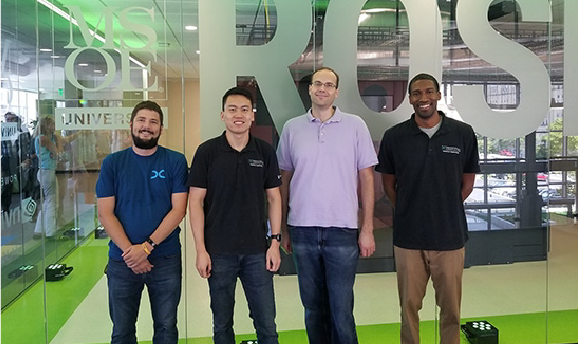Artificial Intelligence: Get on Board or Get Out of the Way

Artificial intelligence – machines’ ability to learn on their own – promises to change the way business is done.
“It really is a new kind of industrial revolution, ” says Derek Riley, Ph.D., computer science program director at Milwaukee School of Engineering (MSOE). “Much the way assembly lines revolutionized how things were made, AI technology is going to change the way people interact with computers, other people, and just about everything.”
Artificial intelligence applications have been around for more than a decade, but their use is reaching a tipping point due to advances in computing technology, the massive amounts of data that have been compiled, and the development of algorithms that are now sophisticated enough to comb through data to identify patterns and solve real problems.
“AI is all about streamlining decision making,” Riley says. “It’s about letting humans do what humans are good at and letting computers do what computers are good at.” Jeff Krueger, director, systems engineering at Waukesha-based Dedicated Computing, agrees. “Data analytics, machine learning, and artificial intelligence are changing how diseases are diagnosed,” he says. “Students training through simulators will have the ability to dynamically adjust to the learning techniques of the individual, creating deeper and engaging environments that will increase overall learning.”
Dedicated Computing designs, develops, tests, and manufactures application-specific, high-performance computational solutions used in life sciences, healthcare, training and simulation, and Industry 4.0. It is sponsoring the Dedicated Computing Data Analytics Laboratory – a data-rich, reconfigurable laboratory space – in MSOE’s new Dwight and Dian Diercks Computational Science Hall.
Krueger says MSOE’s new lab will be critical for giving people the skills needed to fully leverage artificial intelligence.
“For many years, sensors, data collection endpoints and IT systems have logged an incredible amount of data, most of it dark – which means it is stored, but has not been looked at or processed,” he says. “Embedded in this data are potentially patentable ideas, as well as new and unique methods by which a product can surpass the competitors. Data analytics and increased computational capability will make large and small businesses more nimble, allowing them to create impactful and beneficial solutions.” Riley agrees. “In order to be effective, small companies have to understand the general ideas of how these technologies work, so they can make good business decisions around where they should use an AI solution to address a problem,” he says.
MSOE is at the forefront of bringing artificial intelligence into the mainstream.
“Our focus on AI is pretty unique,” Riley says. “The only two schools that I can point to that are doing something in the same vein are the Massachusetts Institute of Technology, which recently realigned their computer science department, and Carnegie Mellon University. Both are much bigger, research-focused universities. What makes us unique is that we are focused on undergraduate students and applied skills.”
“What MSOE is doing is fantastic for Wisconsin, the Midwest, and all those impacted by the migration of knowledge across all domains,” says Krueger. “Investing in the infrastructure, resources, and staff will benefit Wisconsin, as well as current and future students. We hope to aid in increasing the awareness of technology, methods, and our experience in developing and managing similar solutions.”
This article was originally published as a supplement to the Milwaukee Business Journal, Sept. 13, 2019

